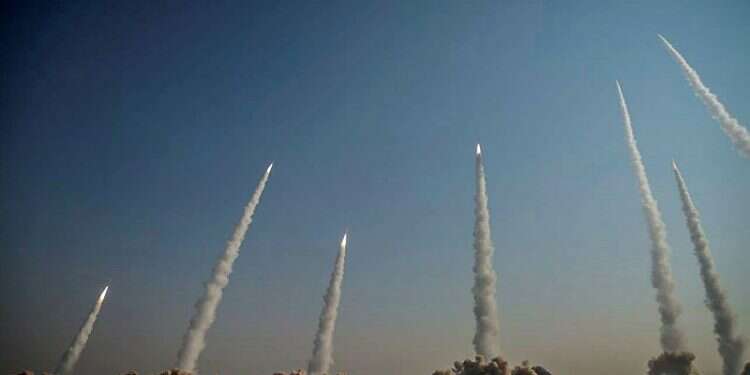Defense Minister Benny Gantz on Tuesday said Iran was installing 1,000 additional advanced IR6 uranium enrichment centrifuges at underground sites being built near its Natanz nuclear plant, and that the Islamic republic was now just weeks away from obtaining enough fissile material for a first bomb.
Follow Israel Hayom on Facebook, Twitter, and Instagram
According to Eli Bar-On, an expert on missiles and advanced weapons systems, "There is a difference between the amount of fissile material required for manufacturing a bomb and operational nuclear capability, and the gap between the two creates a window that could give Israel one last chance to stop the Iranians."
Bar-On continued: "One-thousand centrifuges is a big number, and these are next-generation facilities that make uranium enrichment several times faster [than before]. I'd say that Gantz [on Tuesday] revealed that the same famous window of opportunity, which the West has been relying on and is narrow to begin with, has gotten even smaller. This was the last call to the world to stop burying its head in the sand and to stop Iran before it's no longer possible."
Israeli defense officials have recently estimated that even if Iran does acquire enough fissile material for a nuclear bomb, it will likely struggle to attach a nuclear warhead to a ballistic missile – a process that could stall it operationally for a year or two.
With that, a former senior official at the Shimon Peres Negev Nuclear Research Center, an Israeli nuclear installation located in the Negev desert, who asked to remain anonymous, told Israel Hayom that it's possible to achieve nuclear capability even without using missiles.
"When the Americans dropped the atom bombs on Hiroshima and Nagasaki, they didn't use missiles, rather just loaded the bombs on planes and released them from the air. Missiles are an excellent means of delivering a nuclear strike, but are not the only one," the former official said.
Bar-On agrees with this statement but does clarify: "It's true that Iran is very close to the point where it can detonate a nuclear device and maybe even arm its planes with one, but there's a good reason it is investing so much effort in its missile project. The Iranian air force is extremely outdated and suffers from a severe shortage of spare parts due to the longstanding embargo imposed on the Islamic republic, even before it started developing a nuclear program. It will be very hard for them to penetrate Israel's air defense systems with planes.
"Any type of nuclear capability is an intolerable threat from Israel's perspective, but we need to mainly prepare for the scenario in which they have ballistic nuclear capabilities. The Iranians have recently become proficient in launching larger missile barrages, and the problem is there is no way of knowing which missile amid a barrage is armed with a nuclear warhead," Bar-On continued.
Subscribe to Israel Hayom's daily newsletter and never miss our top stories!
Moreover, due to this threat, Bar-On said, it is imperative that Israel develop advanced missile interception systems.
"The only means capable of efficiently contending with large missile barrages is a high-powered laser system – ideally at least 1,000 kilowatts – and the State of Israel needs to accelerate its development as much as possible and not suffice with developing smaller laser cannons only suitable for rockets and mortar shells," he said.




